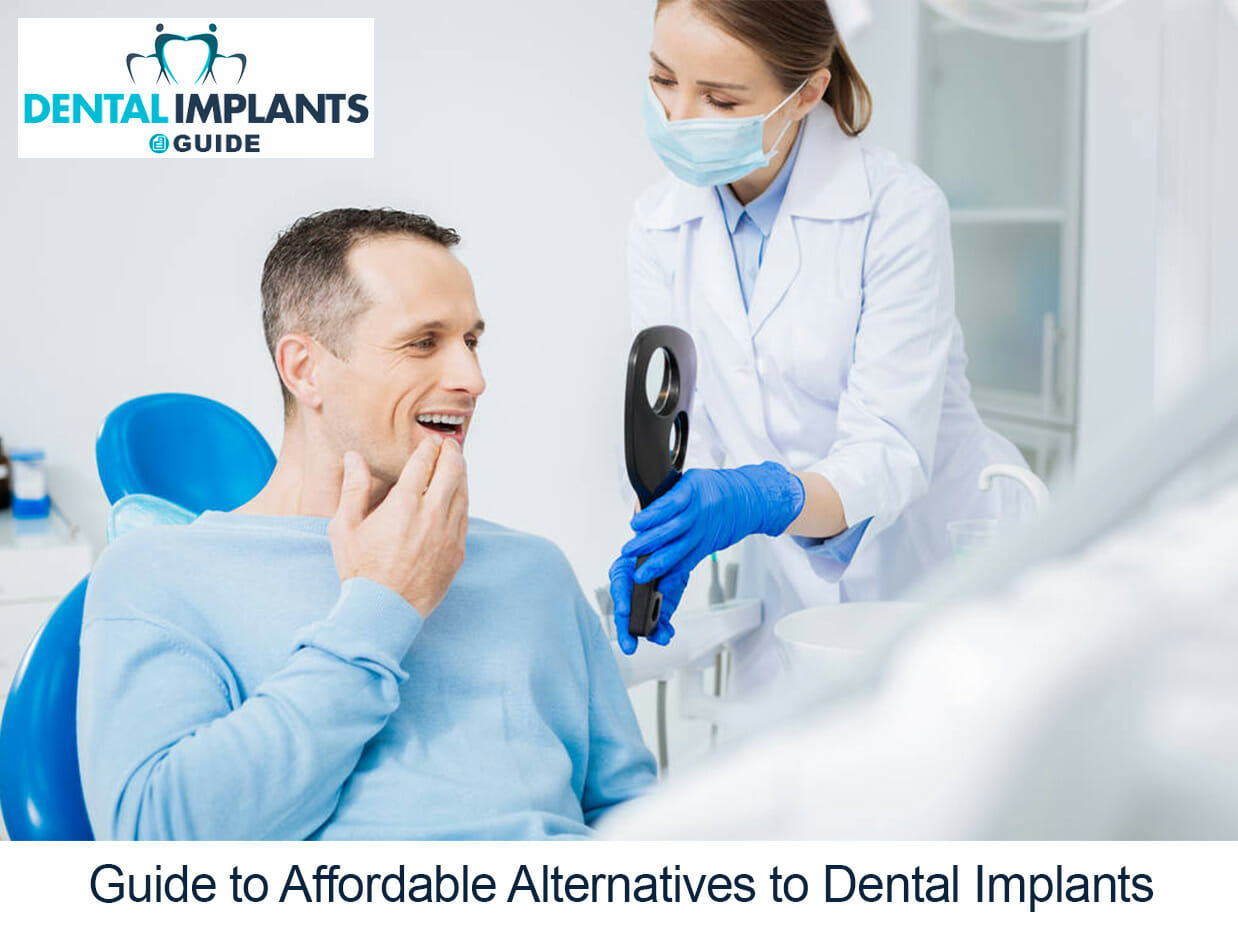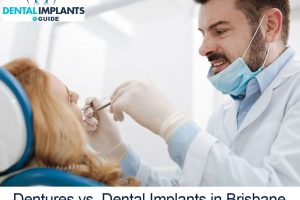Guide to Affordable Alternatives to Dental Implants
Guide to Affordable Alternatives to Dental Implants
Statistics have shown that adults in Australia have an average of 4.5 missing teeth. Whether you’ve lost teeth due to poor oral hygiene, trauma, oral diseases, or other factors, you’ll need to replace the damaged or missing teeth. Missing teeth aren’t just a cosmetic issue or a natural part of aging. They have the potential to harm your oral health, self-confidence, and appearance. Most importantly, missing teeth can cause adjacent teeth to drift, causing bite alignment problems and jaw stress.
High Quality Dental Implants Affordable Prices FREE Consultation

However, having missing teeth is not the end of the world. Fortunately, there are particular ways to replace missing teeth. The most common way is through dental implants.
Dental implants are popular among those with unhealthy or missing teeth because of their realistic appearance and long-term durability. However, when multiple teeth need to be addressed, an aggressive approach may be desired for quick results.
Because you may not have numerous days available for appointments, procedures, and follow-up, the All-on-4 and All-on-4 solutions may be suitable. Because of your fear and anxiety, you may avoid going to the dentist.

How Do Dental Implants Work?
Because it fuses to the jawbone, a dental implant is often solid. They can provide stable support for artificial teeth as a result of this. Dentures, bridges, and single teeth attached will not slip or shift in the mouth. This is advantageous, mainly when speaking or eating. Compared to traditional dentures or bridges, this secure fit makes artificial teeth feel more natural.
The Different Types of Dental Implants
Let’s go over your options for dental implants. Dental implants come in a variety of shapes and sizes. The two most common types are regular or traditional dental implants and all-on-four dental implants.
Single Tooth Replacement
If only one tooth is missing or if multiple teeth are missing in random locations throughout the mouth, this method is used. For the jawbone to fuse around a titanium post, it is implanted in the jaw. The implant’s top is then fitted with an abutment piece.
Consecutive Teeth Replacement
An anchored dental bridge can be used to replace multiple consecutive missing teeth. Unlike traditional bridges, you won’t have to worry about your natural teeth wearing down. Instead, two dental implants are placed at the ends of the missing teeth area. End-to-end dental crowns will connect to the implant, with artificial teeth in the middle. You will have the security you require.
Full Arch Replacement
Dentures are usually the best option if you’re missing an entire arch of teeth. Implant-supported dentures combine the stability of implants with the comfort of a removable denture. A denture is secured to a number of implants that are placed into the arch. This denture isn’t removable and doesn’t require any special care.
(Discuss your dental situation with us)
Alternatives to Dental Implants
1. Dental Bridges – A dental bridge is recommended when a patient has one or more missing teeth. Dental crowns support the missing tooth on both sides. Dental bridges are permanently attached to your teeth and will not come loose or slip out, allowing you to speak and eat normally.
2. Dentures – are a tooth replacement option that is natural-looking, comfortable, and removable. Depending on the number of teeth that need to be restored, you can choose between full and partial dentures.
- Partial Dentures: Partially dentures are a great way to replace one or more missing teeth in the upper or lower jaw. They’re made of gum-coloured bases with replacement teeth attached to your supporting teeth. To ensure that your dentures fit properly, you may need a crown on your supporting teeth.
- Full Dentures: A full denture is recommended when you have lost all of your teeth, or your existing set needs to be removed due to decay, infection, pain, or other dental issues. The bone ridges, palate (mouth roof), and gums form a seal that keeps a full upper denture in place, while dental implants keep a full lower denture in place (anchors).
- Implant-supported Dentures: Aside from the dentures mentioned above, you can also get an implant-supported denture. Patients who want to improve their bite function and denture stability will benefit from it. These dentures are extremely functional and are held in place by implants. They do, however, necessitate a strong and healthy jaw bone to support the implants.
3. Resin-Bonded Bridge – Resin-bonded bridges are similar to dental bridges in that they look, feel, and function like natural teeth. The only difference is that the false tooth will be attached with resin rather than adjacent teeth, unlike dental bridges. The resin is placed behind the teeth to keep the false tooth in place. This procedure is less invasive and, if necessary, can be reversed.
4. Flipper – Flipper is a temporary partial denture attached to the sides of the missing tooth and looks natural. It prevents adjacent teeth from drifting by relying on the palate of the mouth or the suction of the roof. Furthermore, it is simple to wear and does not require metal clasps. Flippers, while less expensive, are not a long-term solution.
5. Implant-Supported Bridge – An implant-supported bridge is recommended if you have several missing teeth. Adjacent teeth are held in place with implants to support the missing tooth or teeth. Give a beautiful, natural look while improving your oral health and functionality.
Cheap Dental Implants Near Me
Don’t just take your regular dentist’s estimate when looking for low-cost dental implants. You should shop around to compare prices for dental implants, just as you would for any other major purchase.
A dentist can’t give you an accurate cost estimate without first inspecting your mouth. This consultation may or may not be free, and you certainly don’t want to overspend at this point.
You can obtain an estimate of implant costs by contacting the clinic or visiting Perth dental implantology.
Alternatively, call the number below to inquire about prices from local implant dentists. Even close dental clinics can charge wildly different prices for dental implants.

Factors Influencing Dental Implant Prices
- Dental implant type or brand
- The cost is ultimately determined by the number of dental implants used.
- Bone augmentation necessitates all surgical procedures.
- Bone gravity materials were used.
- On the implant, the type of artificial crown
- The kind of abutment that was used was
- The type of anesthesia employed
- Regardless of the outcome of corrective surgery
A Good Candidate For Implant Treatment
Dental implants may be recommended for people who are uncomfortable with their dentures or bridges or who cannot obtain them. This could be due to various factors, such as sore spots, gagging, or ridge problems. Furthermore, some people dislike traditional bridges because they require support from adjacent teeth. In the case of implants, however, the adjacent teeth do not need to be ground down to secure the replacement teeth or tooth.
A good candidate for dental implants has 9healthy gums, enough bone to support the implant, and excellent oral hygiene. Patients with insufficient bone should be able to undergo jawbone reconstruction surgery.
Frequently Asked Questions for Dental Implants
Some dental implant procedures are uncomfortable, but not as much as a root canal. Patients are usually given local anesthesia as well as a sedative. After the procedure, you should expect to be sore for a few days. Until all of the procedures are completed, and the new crown is securely in place, you must avoid hard or crunchy foods.
Even in healthy candidates, complications from the required surgeries include infection of the implant site, damage to other teeth or nerves in the mouth, and, in the case of upper jaw implants, problems caused by the implant entering the sinus cavity above it.
Teeth implants are very similar to natural teeth in terms of daily care. Brush and floss restored dental implants twice a day to keep them clean and plaque-free. Following a meal, it is necessary to clean. This is accomplished by gently brushing the implant paying particular attention to all sides.
Once fused to the jawbone, dental implant posts typically become a permanent part of the mouth. The crown, bridge, or denture secured to the implant usually lasts several years, sometimes even decades, before needing replacement. It is important to note that the longevity of dental implants can be impacted by oral hygiene, so brushing, flossing, and receiving professional dental cleanings on a routine basis are vital to help prolong the lifespan of your restoration.









